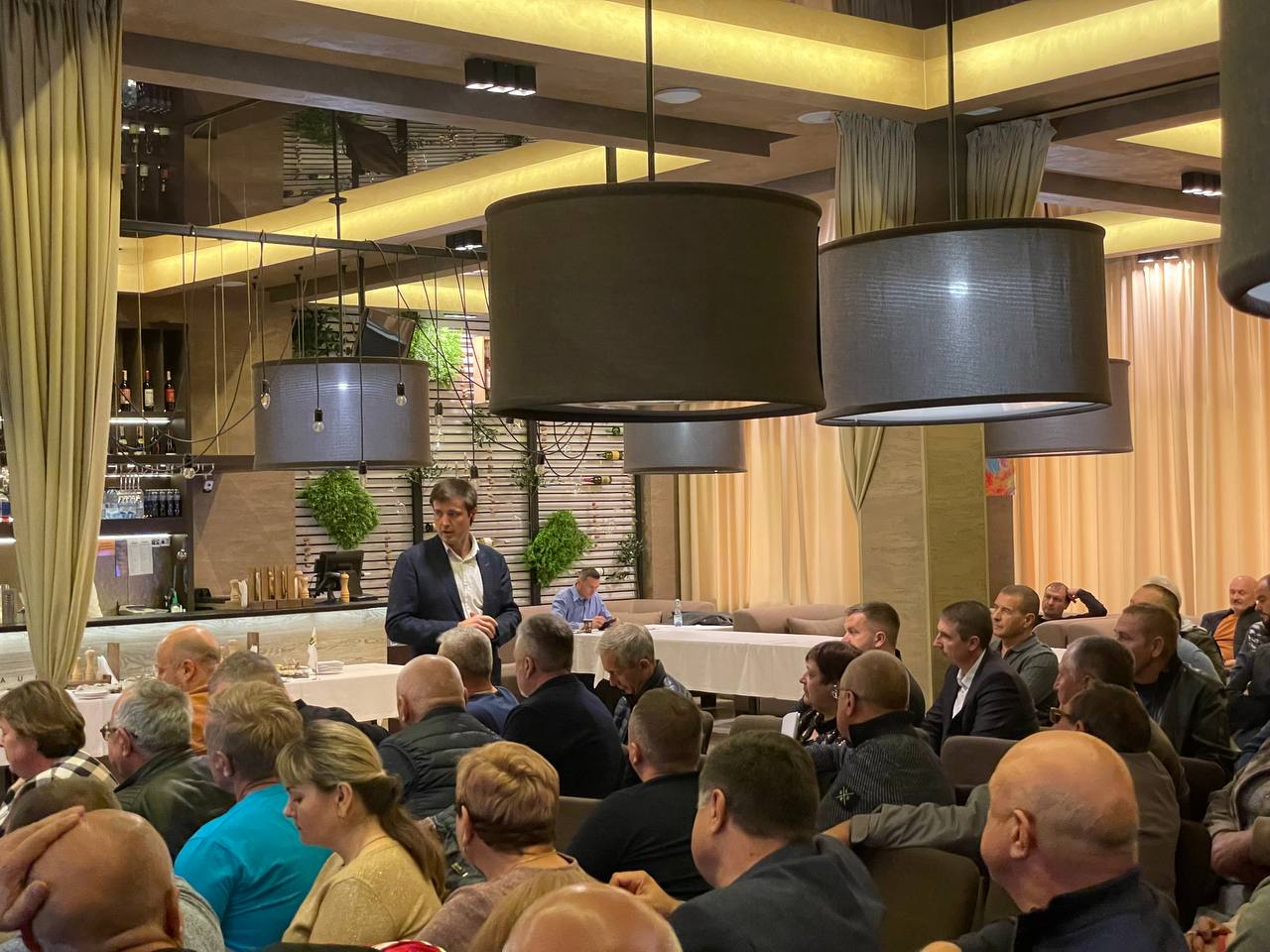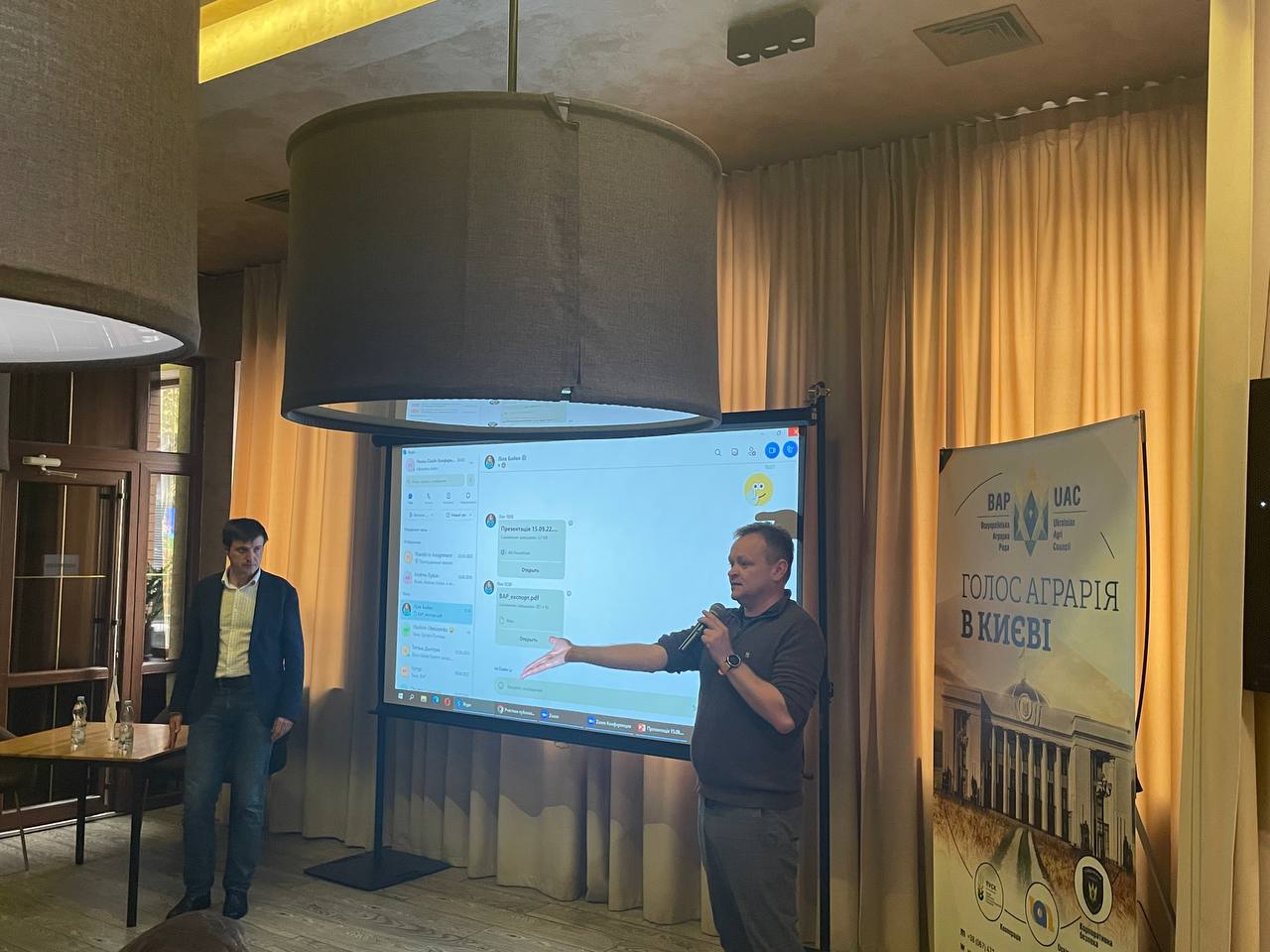
Almost 100 agricultural producers from Poltava, Kharkiv, Sumy and Dnipropetrovsk regions were gathered for a meeting with the UAC Chairman Andrii Dykun and First Deputy Minister of Agrarian Policy and Food of Ukraine Taras Vysotskyi.
"We have one goal - to hear, discuss and contribute to the solution of urgent problematic issues of the agricultural sector," said the UAC Chairman Andrii Dykun and thanked the farmers for their support of Ukraine, work in extremely difficult wartime, the humanitarian mission of the farmers and their help to the population.
Among the main issues that worried agricultural producers: low prices for agricultural products, work under occupation (collaboration law), blocking of tax invoices, reservation of agricultural producers, fields demining, cases of withdrawal of equipment from farms for the needs of the army, increase in prices for railway transportation and problems with logistics highways, etc. Separately, they focused on the issue of compensation for losses to farmers whose enterprises were destroyed or damaged as a result of military actions.

The main theses of the meeting:
About logistics
There is a signal from Ukraine's international partners that the "grain initiative" should be prolonged. Land export routes will continue to be developed, but they are much more expensive for the export of agricultural products than sea routes. At the current pace, in the near future we will be able to increase the volume of agricultural products export to 5.5-6 million tons. Before the full-scale war, there were 6 million tons.
About the reservation of conscripts - workers in the agricultural sector
In March 2022, the Ministry of Agrarian Policy included in the reservation list almost all professions needed by the agricultural sector. 200,000 workers were booked for six months. On September 13, this deadline expired, and the government extended the reservation for another two months. Nowadays, the parliament is voting on a draft law that should facilitate the reservation procedure. It means electronic submission of documents and receipt of an electronic reservation document.
Work in the occupation (draft law No.7646 "On Amendments to the Law of Ukraine "On Ensuring the Rights and Freedoms of Citizens and the Legal Regime in the Temporarily Occupied Territory of Ukraine" regarding the Peculiarities of Activities in the Temporarily Occupied Territory of Ukraine" and the Draft Law No.7647 “On Amendments to the Criminal Code of Ukraine on improving responsibility for collaborative activity")
It is very difficult to determine in the legal field who really betrayed and started working for the occupier, and who was forced to do so. The line is too thin. Therefore, it is planned to introduce the term "voluntary collaboration". If a person voluntarily agreed to cooperate with the Russian invaders, then this will be considered as a crime. If it was forced cooperation with the occupier, then it would not be considered as a treason.
State support
From February 24, 2022, all expenditures, including state support for the agricultural sector, were redirected to military needs. In the budget for 2023, there are no expenditures that would be redistributed by the state (except social and military). In the budget for the next year, funds are fixed only for two types of grants: horticulture and greenhouses. Funds for gardens in the amount of UAH10 million will be allocated if the area of such gardens are 20 hectares, greenhouses - up to 2 hectares (up to UAH7 million). Of course, an inflation adjustment will be made in 2023.
The European Union allocated funds to support a small agricultural producer, namely a payment per one hectare. Small producers with up to 120 hectares under cultivation are provided with a subsidy of UAH3,100 per hectare, UAH10,300 will be paid for one cow. Application for grants is made through the “Diia” electronic portal, payment per hectare and cows is also online through the State Agrarian Register.
Loans under the "5-7-9" program will continue to work next year.
The government is developing a mechanism for state lending to restore affected because of the war farms. Approximate criteria - the facilities should be located no closer than 50 km from the front. The loan will be unsecured, at 0% with deferred payment of installments. This support should start already this year and will be extended until 2023.
About integration with the EU
From October 1, "customs visa-free" will be started. It will allow a joint inspection of goods at Сustoms, which will make the passage of trucks two time faster. The verification will take place simultaneously, not one by one. Also, the electronic queue will be launched from October 1. It will be possible to sign up through "Diia" portal. You should register according to the customs declaration and clearly understand that, for example, on October 10 from 6 to 10 a.m. you will be waiting at the border, and the driver does not need to sleep and spend 5 days in the car.
There is access to the European Union market. It is clear enough that when all quotas and tariffs on agricultural products were canceled on June 6, more horticultural and processing products would be exported to the West than before the full-scale invasion. Ukraine is now becoming the largest exporter of dairy products in the EU. Although they had an overproduction of dairy products. Previously, the EU plans to extend free access until the end of 2024.
Currently, the EU is analyzing Ukrainian legislation and will present the result in December (what we need to change in order to get the EU membership). There are no big obstacles and problems for farmers yet. If there are comments that will have a negative impact on the Ukrainian agricultural sector, a common position will be worked out together with agricultural associations.
Thursday, 15 September 2022